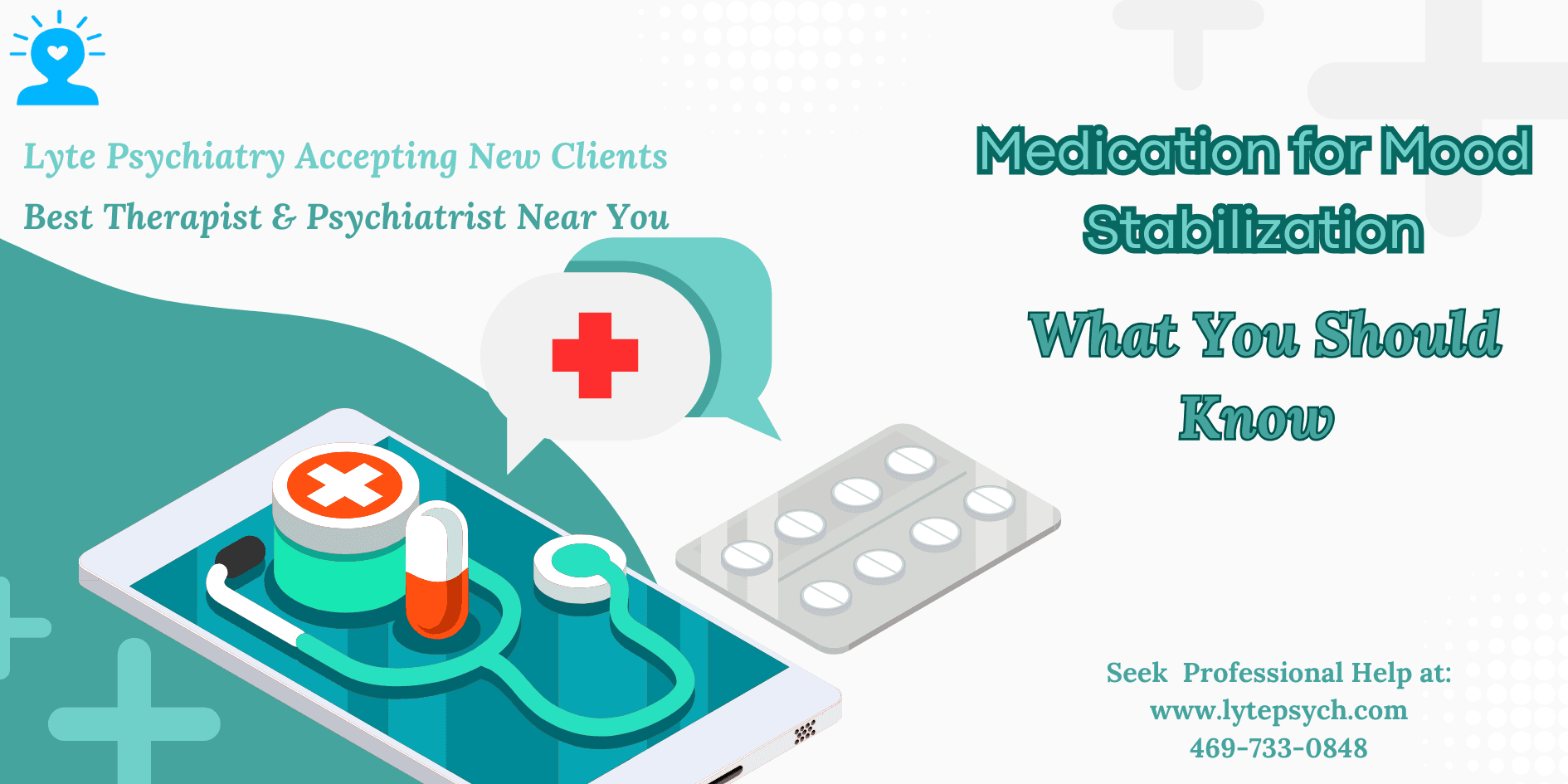Thu May 29 2025
Medication for Mood Stabilization: What You Should Know at Lyte Psychiatry (Best Adults and Adolescents Therapist and Psychiatrist Near You, Affordable Therapist and Psychiatrist Near You) Dallas & Arlington, TX.

Medication for Mood Stabilization: What You Should Know at Lyte Psychiatry
(Best Adults and Adolescents Therapist and Psychiatrist Near You — Affordable Therapist and Psychiatrist Near You | Dallas & Arlington, TX)
When Mood Swings Start Disrupting Life, Medication Might Help Bring Back Balance
Everyone experiences ups and downs. But if your mood feels like a rollercoaster—too high one week, too low the next—or you’re struggling to stay emotionally steady, it could be more than just stress. You may benefit from mood-stabilizing medication as part of your mental health care.
At Lyte Psychiatry, we work with adults and adolescents in Dallas & Arlington, TX to help manage mood swings caused by conditions like bipolar disorder, depression, anxiety, or mood dysregulation. Medication is just one tool—but it can be a life-changing one when used correctly.
🧠 According to the National Institute of Mental Health, mood stabilizers are most commonly used to treat bipolar disorder, but may also support other mood-related conditions.
What Are Mood Stabilizers?
Common mood stabilizers include:
Lithium – A classic and highly effective treatment for bipolar disorder
Anticonvulsants (like valproate or lamotrigine) – Often used when lithium isn't the best fit
Atypical antipsychotics (like quetiapine or aripiprazole) – Helpful for managing mood episodes and irritability
Certain antidepressants – When paired carefully to avoid triggering mood shifts
When Might Mood-Stabilizing Medication Be Helpful?
You may benefit from mood stabilization if you or your teen experiences:
🔷 Severe mood swings from high energy to deep lows
🔷 Periods of intense irritability or agitation
🔷 Racing thoughts or impulsive decisions followed by fatigue or guilt
🔷 Depression that doesn’t respond well to therapy alone
🔷 Emotional dysregulation that impacts relationships, school, or work
🔷 Co-occurring conditions like ADHD or PTSD
Pros of Mood Stabilizing Medication
✅ Reduces emotional highs and lows
✅ Helps prevent relapse or recurrence of mood episodes
✅ Can improve sleep, focus, and daily functioning
✅ Supports more effective therapy and life stability
✅ Often life-changing for those with bipolar disorder or treatment-resistant depression
Things to Consider
⚠️ May require time to find the right dose or medication
⚠️ Side effects can include fatigue, weight changes, or nausea (usually temporary or manageable)
⚠️ Routine monitoring (e.g., bloodwork) may be needed for some medications
⚠️ Should be taken consistently and never stopped suddenly without medical guidance
⚠️ Best results often happen when combined with therapy and lifestyle changes
Let’s Find Your Balance—Together, Schedule an Appointment at Lyte Psychiatry (Best Psychiatrist and Therapist Near You) Located In Dallas & Arlington, TX
To Schedule an appointment. Click Here
To see our services. Click Here
Call us if you have questions at 469-733-0848
Frequently Asked Questions:
Q: How long does it take for mood stabilizers to work?
A: Some people notice changes within a week or two, but full effects may take 4–6 weeks depending on the medication and individual.
Q: Will I have to take mood stabilizers forever?
A: Not always. Some people take them long-term, while others use them during periods of high symptom severity. Your plan will be tailored to your needs.
Q: Are these medications safe for teens?
A: Yes—under careful medical supervision. We provide age-appropriate care and include parents in the treatment process.
Q: What if I’m not ready for medication?
A: That’s okay. We’ll explore therapy and other supports first. You’re in control of your treatment journey—we’re here to guide, not pressure.